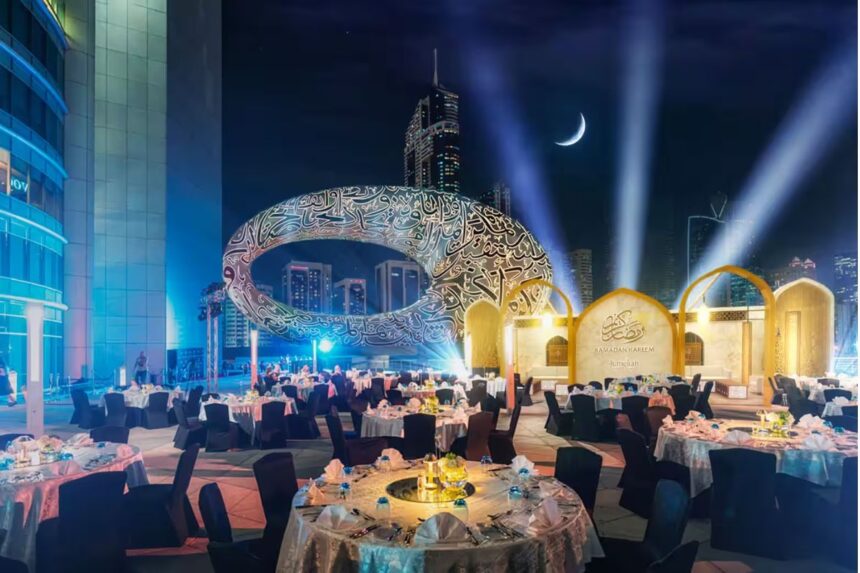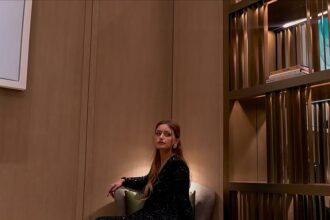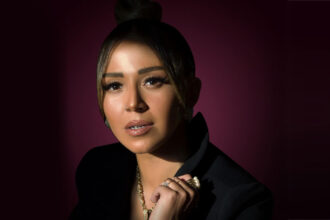One of Dubai’s most memorable iftars isn’t plated at a luxury buffet or served in a grand hotel hall. It’s shared cross-legged on a carpet, beneath the stars, in a historic courtyard where the food is traditional and the conversations are transformative — an experience that lingers long after the last cup of gahwa is poured.
Each evening during Ramadan, as five-star hotels across the city compete with elaborate buffets and dazzling ambience, a more grounded and authentic experience unfolds in the heart of Al Fahidi Historical Neighbourhood. Inside a 150-year-old wind tower, the Sheikh Mohammed bin Rashid Al Maktoum Centre for Cultural Understanding (SMCCU) hosts an iftar that continues to hold its own, and, for many, surpasses the city’s glitzier options.
Long before the call to Maghrib prayer echoes through the alleyways, scores of guests from across the globe settle cross-legged on carpets, shoulder-to-shoulder, in a courtyard packed with people and stories. The seating is simple: traditional cushions, low tables, lanterns, and retro décor that transports visitors back in time. The atmosphere is immersive.
“This is my third iftar since arriving in Dubai, and while the hotel ones were impressive, nothing comes close to this,” said a tourist from Germany. “There’s something real and human about sitting on the floor with strangers and learning about the culture this way.”
The evening begins with hosts Noura and Hamad, dressed in traditional Emirati attire, welcoming guests and offering a brief introduction to Islamic beliefs and Ramadan customs. As the sun sets, everyone breaks their fast with Khalas dates and crispy sambosas, followed by small handle-less cups of gahwa, Arabic coffee flavoured with saffron and cardamom.
“The cups are called finjan,” Noura explains with a smile. “They’re never filled to the brim, because in our tradition, a full cup means you want the guest to leave. And if you want more coffee, just extend your hand with the cup. If you’re done, shake it slightly, of course, when it’s empty.”
Noura also explains that the Khalas variety of dates is prized for its sweetness, which is why Emiratis often don’t add sugar to their coffee. “The coffee itself is light and fragrant, meant to complement the dates.”
Dinner is a hearty spread of traditional Emirati dishes, served buffet-style. Guests dig into chicken machboos, lamb tharid, and vegetable salona. The spirit of Arab hospitality is unmistakable: warm, generous, and communal.
After the meal, guests are taken on a short, guided tour of a nearby mosque, where they gain deeper insight into Islamic practices. The evening ends with rooftop desserts — umm ali, luqaimat, and tea — alongside cultural games and live cooking.
One of the most engaging segments is the open Q&A session. No question is off limits. Noura and Hamad answer everything from religious customs to everyday traditions with candour and humour.
“Why do most Emirati women wear black abayas while men wear white kandouras?” a curious guest asks.
“It’s not religious, just tradition,” Noura replies, before walking guests through a live demonstration of traditional Emirati attire. She showcases a sheila, the elegant black headscarf, and a richly embroidered dress often worn beneath the abaya. Then, holding up a metallic-looking mask, she captures everyone’s attention.
“It looks like metal, but it’s actually made of delicate fabric and it’s called burqa or burghu” she explains. “Bedouin women used to wear it to signal they were married. These days, you’ll mostly see young women wear it for selfies.”
She goes on to explain the practical roots of the abaya. “In the past, women owned just two or three dresses. The abaya acted as an extra layer to protect their clothes from fading in the sun, and it helped preserve modesty, too.”
Hamad chimes in to explain the men’s attire. “The white kandoura, also called dishdasha, is practical for the heat. And this black cord on my head called an agal was used to tie the front legs of camels so they wouldn’t wander away.”
The SMCCU iftar costs Dh180 per person, but the experience it offers is priceless. For over 25 years, the centre has played a vital role in bridging cultural gaps between UAE nationals and the country’s vast expatriate population, under the motto “Open Doors. Open Minds.”
“Our Ramadan experience is more than just a meal,” says Hamad. “It’s a chance for people to connect, learn, and understand one another a little better. That’s what this month and this country is all about.”
ALSO READ:
- Restaurant Review: Soirée Dubai is the perfect blend of chill and buzz
- Restaurant Review: Adaline serves nostalgia paired with a spectacular show








